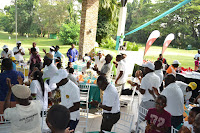Mr.
Hubert Nsoh Zan, a staff of the Energy Commission and Priscilla Nana Boatemaa Asante,
staff at the Ghana National Petroleum Cooperation (G.N.P.C), has solemnised
their marriage at the Holy Cross Parish at Choggu, Tamale.
To
ensure a happy marriage, Most Rev. Peter Paul Y. Ankyier, Bishop of Damongo
Diocese, who officiated the Mass, urged the couple to always acknowledge God,
who established marriage institution. ‘Be prayerful and loyal to each other’ he
added.
He
described marriage as God’s gift to man and a vocation to serve the Church,
adding that the institution of marriage is a faith experience and a witness to
discipleship.
Observing
that marriage is a continuous learning process and work in progress, the
Prelate he called on the couple to adjust, be patient, forgiving, kind and
supportive to with each other.
The
Bishop entreated the couple to remain responsible to their external families
but be careful in how they allow them into their marriage, stressing that couple
should first please their spouse.
Since
there were challenges with every commitment, Bishop Angkyier stressed the need
for the couple to be one minded, have faith and hope in God.
The
Bishop explaining the role of husbands in the marriage, tasked Hubert to develop
a vision and mission for his family and promote the spiritual development of
his wife, and urged the Priscila to accept her husband’s authority, acknowledge
and appreciate his vision.
He
entreated Hubert to show love to his wife by being devoted and committed, and
urged Priscilla to respect, be supportive and cooperative with her husband.
The
Groom is the son of the Mr. Samuel Zan Akologo, Executive Secretary for the
Department of Human Development at the National Catholic Secretariat (NCS), Accra.
Concelebrants
at the well-attended Mass were Very Rev. Frs. Daniel Saaka, Vice Rector of St.
Victor’s Seminary, Tamale and Hilary Pogbeyir, Parish Priest of Holy Cross
Parish.
Among
well-wishers at the Mass were relatives, members of Knights of Marshall and
friends.





















